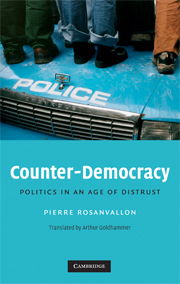Part 4 - Unpolitical democracy
Published online by Cambridge University Press: 24 May 2010
Summary
The development of powers of oversight, prevention, and judgment has profoundly changed the way modern political regimes operate. Such regimes can no longer be described solely in terms of their constitutional arrangements. To put the point another way, democratic activity now extends well beyond the framework of electoral-representative institutions. Many other practices and structures of the sort explored in the preceding chapters must also be included. The resulting system is complex but, in its own way, coherent. What these various counter-democratic powers have in common is that they describe a new architecture of separated powers and a much more subtle political dynamic than one ordinarily finds in political theory. For instance, many scholars have explored the theme of direct versus representative democracy, yet a more satisfactory account of today's political reality emerges from our study of the various modes of oversight and prevention. Indeed, a whole range of social and political practices make sense only in terms of the dialectic of action and control. Similarly, the distinctions between voting and judgment and between positive and negative powers offer a new interpretive framework for approaching the question of separation of powers in its properly societal context. By attending to the counter-democratic dimension, we can paint a fuller picture of the way in which various forms of social expression help to structure the political field. Our work thus yields a fuller, more complex understanding of democracy's social context.
- Type
- Chapter
- Information
- Counter-DemocracyPolitics in an Age of Distrust, pp. 249 - 252Publisher: Cambridge University PressPrint publication year: 2008



